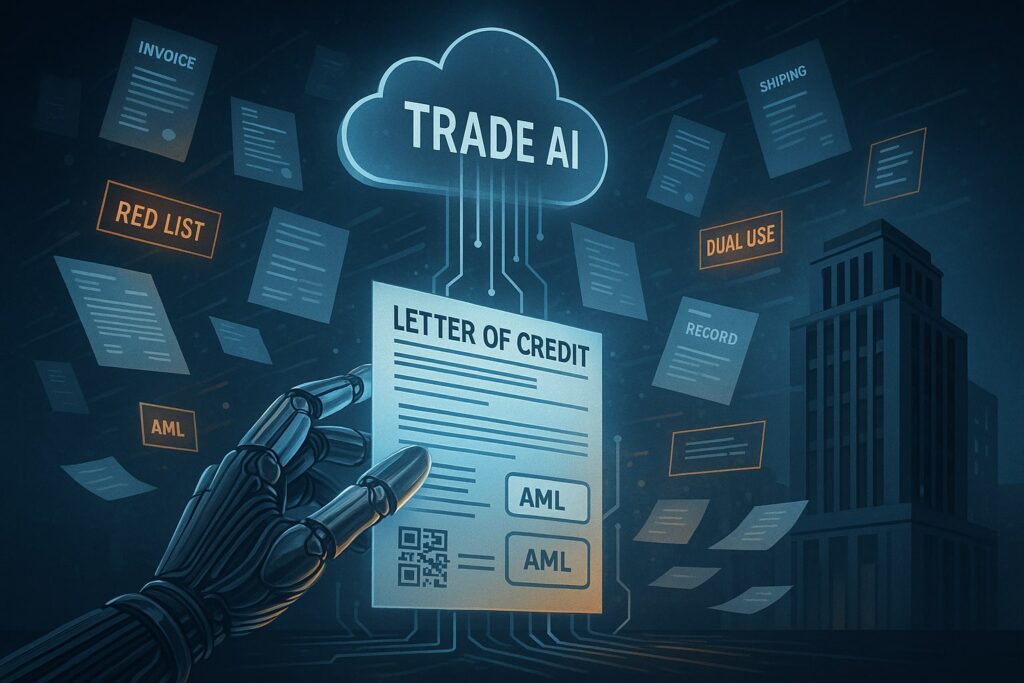In the arcane world of trade finance, paperwork and compliance checks have long been necessary evils. Banks facilitating international trade must vet mountains of documents – letters of credit, invoices, shipping documents – to prevent fraud, money laundering, or sanctions breaches. This manual process is labor-intensive and costly: a large trade finance bank might spend $25–42 million per year on compliance, sanctions screening and anti-money-laundering tasks, without that cost adding any new revenue. Now, fintech innovation is finally easing this burden. AI-driven automation is making inroads into trade finance compliance, and Amsterdam-based startup Conpend has emerged as a leading player.
Conpend, founded in 2016, provides AI-powered tools that digitize and scrutinize trade finance documents, automating what used to be tedious manual checks. Its flagship platform, TRADE AI, can scan both paper and digital trade documents, extract relevant data, and then verify compliance against a set of rules and regulations. For example, Conpend’s system “reads” a letter of credit or bill of lading and automatically cross-checks details against anti-money laundering (AML) watchlists, know-your-customer (KYC) databases, sanctions lists, and other regulatory criteria. This means a process that once took analysts hours of line-by-line review can be completed in minutes, with the AI flagging only exceptions for human follow-up. At Denmark’s Danske Bank, which rolled out Conpend’s TRADE AI app, the solution is expected to create a “digital environment” out of a traditionally paper-based business, yielding “significant efficiency gains” after training the system on the bank’s data.
Table of Contents
ToggleA Digital Solution for a Paper Problem
Trade finance has been notoriously slow to digitize, in part due to its complexity and the high stakes of compliance. Every transaction – often involving multiple countries’ laws and vast sums of money – can be a potential channel for illicit activity. Regulators impose strict requirements: banks must verify that trade documents are authentic, goods aren’t from sanctioned entities, no money is flowing to terrorists or proliferators, etc. Traditionally this meant armies of document checkers in trade operations departments. Even today, many banks rely on manual processes and paper documents remain prevalent, adding to delays and errors. The result is not only cost but also risk: an estimated $1 trillion in financial crime proceeds flow through trade channels each year, hidden among legitimate commerce. This exposes banks to penalties and reputational damage if they miss red flags.
Conpend’s solution squarely targets these inefficiencies. Its TRADE AI platform uses machine learning and computer vision to parse unstructured documents – reading scanned PDFs or images of forms – and convert them into structured data. The system then applies rules and AI models to detect anomalies or non-compliance. For instance, it can spot if a shipment’s goods description might be dual-use technology subject to export controls, or if an insurer’s name on a document appears on a sanctions list. By automating 80% or more of preliminary compliance checks, banks can focus human expertise on the truly suspicious cases. In fact, as early as 2018 Germany’s Commerzbank partnered with Conpend to target automating 80% of compliance-related pre-checks in trade finance processing – an ambitious goal that highlights the potential scale of efficiency gains.

Recent developments indicate that investors see promise in this niche. In July 2025, Conpend announced a new majority investment from Amsterdam-based growth fund Cape Investment Partners, aimed at fueling Conpend’s global expansion. While financial terms were not disclosed, the deal effectively gives Conpend the backing to scale its platform to more banks and markets. Conpend already serves over 35 financial institutions worldwide – including major trade finance players like Commerzbank, ING, and UniCredit – and this fresh capital will help it deepen that reach. Cape Investment Partners’ support will provide “strategic guidance and operational scale” as Conpend enters its next phase, said CEO Marc Smith. The message is clear: AI in trade finance has moved from experiment to mainstream tool, and Conpend is positioned as a frontrunner.
Compliance Meets Its Robo-Assistant
The impetus for such automation has only grown in recent years. Geopolitical volatility and sanctions (for example, those on Russia, Iran, or North Korea) have made trade compliance even more complex. Each new restriction or red flag list adds to what a bank’s staff must manually check. Automation offers a lifeline: Increased automation, along with AI and machine learning, can help trade finance reduce operational costs and improve customer experience. Instead of drowning in paperwork, banks can process trade transactions faster and with more consistency. This not only lowers costs but also frees up skilled staff to focus on value-added tasks or customer service rather than rote document-checking.
Conpend’s rise reflects a broader trend of fintech targeting trade finance pain points. Other solutions have emerged in trade document digitization and compliance – from startups like Traydstream and Pelican, to in-house AI projects at major banks. The industry is gradually embracing technologies such as natural language processing (to interpret contracts) and predictive analytics (to flag high-risk transactions). Even regulators are encouraging digitization: initiatives to accept electronic trade documents under law, and trade finance utility platforms, are paving the way for fully digital workflows. Conpend’s partnership with Finastra to offer TRADE AI on a cloud platform exemplifies how these tools are being integrated into banks’ existing trade finance systems.
One concrete success story is at Danske Bank, where Conpend’s TRADE AI was implemented. There, paper and electronic documents are scanned and the AI checks them against predefined business rules and compliance databases. The system automatically runs sanction and AML screenings on transaction parties and flag anomalies. The rollout is being done in phases, training staff and refining the AI, but the expectation is a markedly more efficient, faster trade finance operation once fully deployed.
The Road Ahead: Augmenting, Not Replacing
Despite the progress, AI isn’t expected to completely replace human judgment in trade finance – at least not yet. It should be an augmentation. The goal should be to enhancing human expertise, not replacing it, especially in complex case. There will always be unique scenarios or ambiguous documents that require an experienced eye or further investigation. But by letting machines handle the bulk of routine checks, banks can better allocate their human talent and reduce fatigue-related errors.
For Conpend, the challenge now is staying ahead in terms of accuracy and adapting to new regulations. AI models must be trained on massive volumes of trade data to learn patterns of normal vs. suspicious transactions. This demands continued collaboration with banking partners to feed the algorithms quality data – an area where Conpend’s growing client base gives it an edge. Moreover, the system needs to be agile to accommodate regulatory changes (e.g., a new sanctioned entity list) or client-specific rules.
The market potential is significant. Trade finance is a multi-billion dollar industry globally, and operational efficiency is top of mind for banks facing squeezed margins. If Conpend and similar fintechs can demonstrably cut costs and compliance lapses, banks will readily invest in these solutions. We are already seeing M&A activity: bigger fintech firms or banking consortia could eye acquisitions of trade AI specialists to own the capability. (Notably, Conpend’s competitor Traydstream formed partnerships with Standard Chartered and others, and could be a takeover target.)
In sum, the case of Conpend illustrates how artificial intelligence is transforming one of the most paper-bound corners of finance. The combination of rising compliance demands and available AI technology created a perfect storm for innovation. With its recent capital infusion, Conpend is set to automate trade compliance for more institutions, bringing the industry a step closer to the vision of “digital trade finance.” The days of bankers poring over import documents with rulers and highlighters may soon be as antiquated as the paper telex – replaced by smart systems that learn and adapt to keep trade flowing and bad actors out.












